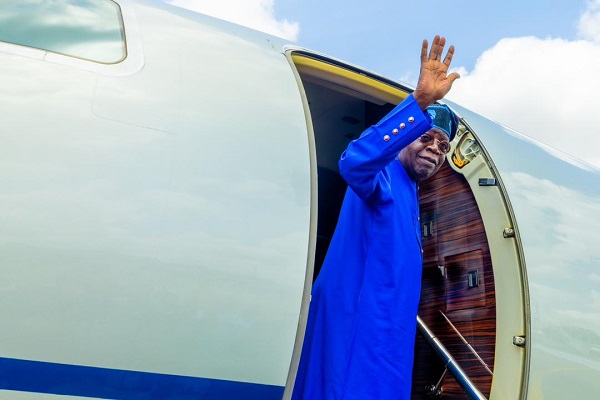Despite the ongoing violence and widespread killings in Nigeria, President Bola Tinubu continues to manage the country’s affairs remotely from Europe. Recently, while in France, he met with U.S. State Department Senior Advisor Massad Boulos, remotely inaugurated a census committee, and condemned recent gunmen attacks in Plateau that killed nearly 100 people.
In a statement issued Thursday, Tinubu’s spokesperson, Bayo Onanuga, confirmed that the president remains fully engaged in Nigeria’s governance, despite being outside the country for nearly two weeks. Tinubu, who traveled from Paris to London, has maintained constant communication with key government officials and has issued directives to security chiefs to address emerging threats across Nigeria.
Onanuga emphasized that Tinubu’s absence is temporary, in line with a previously communicated timeframe of about two weeks. He assured the public that governance continues without interruption, and that the president will return to Nigeria after the Easter holiday to resume his duties at Aso Villa.
While the Presidency has not clarified the specific purpose of Tinubu’s stay in Paris and London, the president’s absence has sparked criticism, particularly from opposition figures. Former Vice President Atiku Abubakar and Labour Party’s Peter Obi have questioned why Tinubu remains abroad while Nigeria grapples with escalating insecurity. Atiku, in particular, criticized the president for staying in France amid the violence in Plateau and Benue states, arguing that Tinubu should return to address the country’s worsening security situation.
Atiku stated that there is nothing Tinubu is doing in France that couldn’t be done in Nigeria, and labeled the trip as a vacation disguised as official business. He argued that the country is facing a national crisis, and the president’s absence reflects a lack of empathy and patriotism.
Similarly, Peter Obi called on the president to return to Nigeria to confront the growing insecurity, pointing out that over 150 Nigerians have died due to violence in the two weeks since Tinubu left. Obi emphasized the importance of securing citizens’ lives and urged Tinubu to cut his trip short and address the crisis at home.
As violence continues to go out of control across Nigeria, many Nigerians feel that their government is failing in this fundamental role.
The killings in Plateau and Benue States, as well as the continued insurgency in the North East, are stark reminders of the deteriorating security situation. Armed groups continue to terrorize rural and urban areas, and many Nigerians live in fear as attacks on civilians, including women and children, become more frequent and brutal.
In regions like the Niger Delta, pipeline explosions and attacks on oil infrastructure have further fueled instability, while in the South East, abductions and targeted killings have become commonplace.
For Nigerians who are witnessing these tragedies firsthand, the president’s absence from the country at such a critical time feels like a betrayal. They see it as a failure of leadership.
While virtual governance and remote decision-making may be effective in certain circumstances, many believe that the current crisis requires the physical presence and immediate intervention of the country’s highest office.
President Tinubu’s current remote governance approach, while ensuring that some directives are issued and some tasks are managed from abroad, has raised concerns about his leadership style. Critics argue that it is simply not enough to govern from a distance while the country is facing such unprecedented levels of violence and insecurity. Leadership in times of crisis requires physical presence, accountability, and decisive action.
For the people of Nigeria, the call is clear: the president must return to Nigeria immediately, face the ongoing crisis head-on, and demonstrate true leadership by addressing the rising tide of violence that threatens the nation.

